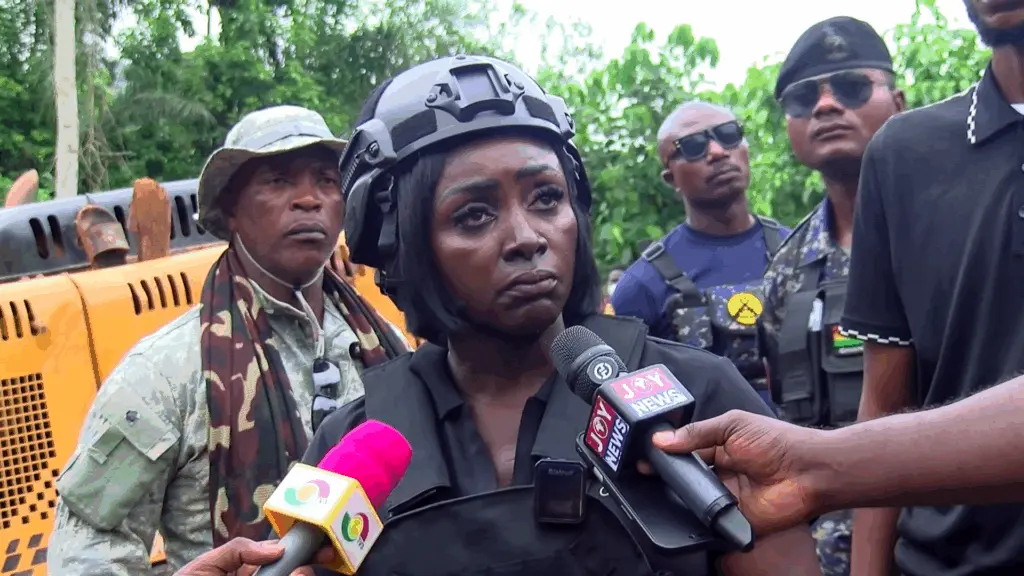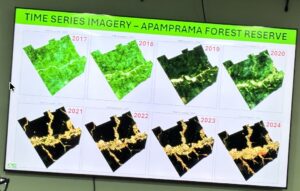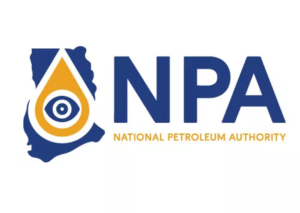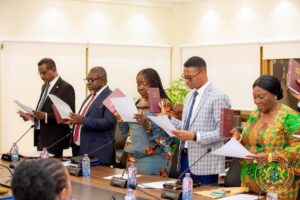
Photo: Dr Hannah Bissiw in a post-operation interview with the press
The Administrator of Ghana’s Minerals Development Fund (MDF), Dr Hannah Bissiw-Kotei, is at the centre of a growing storm over reports that she has spearheaded unauthorised anti-galamsey field operations, including armed raids into illegal mining zones — actions observers say are both legally dubious and institutionally alarming.
The MDF, established under the Minerals Development Fund Act, 2016 (Act 912), is mandated to disburse funds for the development of mining-affected communities and support key regulatory institutions. It is not, however, empowered to carry out field operations, let alone engage in law enforcement activity.
Yet according to multiple accounts from within the Ministry of Lands and Natural Resources and corroborated by internal memos, Dr Bissiw has mobilised resources and personnel — sometimes reportedly armed — to execute anti-illegal mining raids under the MDF’s banner. These actions, critics say, fall well outside the scope of her statutory authority and risk undermining the state’s coordinated response to illegal mining.
No Legal Backing for Field Raids
Act 912 clearly outlines the MDF’s role as a funding mechanism. Section 3 of the Act lists specific beneficiaries of the Fund, including the Minerals Commission, District Assemblies, and mining communities. It makes no mention of field enforcement responsibilities or operational mandates.
“The MDF is designed as a financial instrument — not an enforcement agency,” said one governance expert. “What we’re witnessing is an alarming reinterpretation of the law by an appointed officer.”
Civil society leaders, policy analysts, and senior government officials are demanding urgent clarification. “Who sanctioned these raids? From which budget were they financed? Who bears responsibility for any incidents during these operations?” asked Benjamin Nsiah, Executive Director of the Centre for Environmental Management and Sustainable Energy (CEMSE).
Lack of Coordination with National Enforcement Bodies
Sources within the Ministry confirm that the MDF’s recent incursions into galamsey zones were not sanctioned or coordinated with the National Anti-Illegal Mining Operations Secretariat (NAIMOS), the designated inter-agency task force with legal authority to combat illegal mining.
“This undermines the very idea of a harmonised response to galamsey,” one senior official remarked. “If every agency begins conducting unilateral operations, it creates a dangerous precedent of institutional anarchy.”
Signs of Deepening Institutional Breakdown
The concerns go beyond mandate overreach. According to insiders at the Ministry, Dr Bissiw has failed to attend several high-level meetings intended to ensure operational alignment across agencies. She is also accused of marginalising her deputy — a presidential appointee — and removing the Ministry’s Financial Controller from MDF accounts, effectively weakening established financial oversight mechanisms.
“This is not a case of administrative independence,” a senior civil servant noted. “This is defiance — and it risks eroding public trust in how resources are managed and deployed.”
A Wider Governance Concern
Observers say the implications extend far beyond one agency or personality. If left unchecked, Dr Bissiw’s actions could normalise the fragmentation of governance structures.
“Imagine if other statutory bodies — the Forestry Commission, the Tourism Authority — begin setting up their own paramilitary units in the name of enforcement,” one policy analyst warned. “It would collapse any semblance of order or accountability in the public sector.”
Call for Immediate Oversight
Stakeholders are calling for swift institutional intervention. Among the demands:
• Parliament’s Mines and Energy Committee should summon the MDF Administrator to explain her actions and outline the legal basis for recent operations.
• The Ministry of Lands and Natural Resources must publicly clarify whether it authorised the raids.
• The Auditor-General is urged to initiate a special audit of the Fund’s financial records to trace any disbursements related to unsanctioned field operations.
• Civil society organisations are being called upon to hold public institutions to account and protect Ghana’s governance architecture.
•
“A fund cannot become a force,” a retired bureaucrat told The Hawk. “We need to return to rule-based governance before these excesses become institutionalised.”
As the country grapples with the complex and urgent challenge of illegal mining, the question is no longer just how to win the fight, but how to do so without compromising the rule of law itself.






